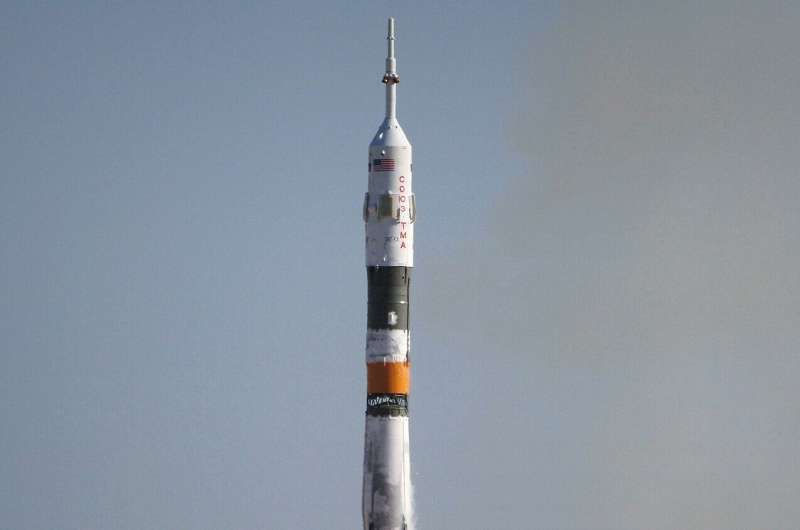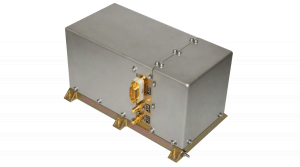
Copernical Team
Two Flight Engineers' stay extended in ISS
 Two International Space Station crew members have had their stay onboard the orbiting lab extended to nearly a year. Meanwhile, space biology and life support maintenance kept the Expedition 65 crew busy on Tuesday.
With the plans for Russian spaceflight participants to visit the space station as part of the Soyuz MS-19 crew in October 2021, NASA astronaut Mark Vande Hei and Roscosmos cosm
Two International Space Station crew members have had their stay onboard the orbiting lab extended to nearly a year. Meanwhile, space biology and life support maintenance kept the Expedition 65 crew busy on Tuesday.
With the plans for Russian spaceflight participants to visit the space station as part of the Soyuz MS-19 crew in October 2021, NASA astronaut Mark Vande Hei and Roscosmos cosm NASA selects five US companies to mature Artemis Lander concepts
 NASA has selected five U.S. companies to help the agency enable a steady pace of crewed trips to the lunar surface under the agency's Artemis program. These companies will make advancements toward sustainable human landing system concepts, conduct risk-reduction activities, and provide feedback on NASA's requirements to cultivate industry capabilities for crewed lunar landing missions.
The
NASA has selected five U.S. companies to help the agency enable a steady pace of crewed trips to the lunar surface under the agency's Artemis program. These companies will make advancements toward sustainable human landing system concepts, conduct risk-reduction activities, and provide feedback on NASA's requirements to cultivate industry capabilities for crewed lunar landing missions.
The Curtin research shines a light on Moon's oldest geologic imprints
 New Curtin research has found the Moon may have been subjected to much greater impacts from asteroids and other bodies than previously thought, building on our understanding of the Moon's earliest geologic evolution.
Published in Nature Communications, the research provides a greater insight of how the oldest impact events on the Moon may have left near-invisible cratering imprints, offeri
New Curtin research has found the Moon may have been subjected to much greater impacts from asteroids and other bodies than previously thought, building on our understanding of the Moon's earliest geologic evolution.
Published in Nature Communications, the research provides a greater insight of how the oldest impact events on the Moon may have left near-invisible cratering imprints, offeri MDA awarded contract for Japan's Martian Moons Exploration Mission
 MDA Ltd. been awarded the full contract from Mitsubishi Electric in Japan to provide a Laser Rangefinder (LRF) altimeter for the Japan Aerospace Exploration Agency (JAXA) MMX (Martian Moons eXploration) mission.
MDA will be providing two redundant flight units (laser range finder - LRF) altimeters and one engineering development unit (EDU) LRF altimeter.
Scheduled to launch in Japane
MDA Ltd. been awarded the full contract from Mitsubishi Electric in Japan to provide a Laser Rangefinder (LRF) altimeter for the Japan Aerospace Exploration Agency (JAXA) MMX (Martian Moons eXploration) mission.
MDA will be providing two redundant flight units (laser range finder - LRF) altimeters and one engineering development unit (EDU) LRF altimeter.
Scheduled to launch in Japane Visionary tech concepts could pioneer the future in Space
 NASA missions make it seem like the future is now - rovers exploring Mars with cutting-edge gadgets, a spacecraft venturing home with an asteroid sample, and a complex space telescope peering at the early universe. So, what's the next big thing? What might space missions in 2050 and beyond set out to discover?
One small NASA program aims to see what could be possible. The NASA Innovative A
NASA missions make it seem like the future is now - rovers exploring Mars with cutting-edge gadgets, a spacecraft venturing home with an asteroid sample, and a complex space telescope peering at the early universe. So, what's the next big thing? What might space missions in 2050 and beyond set out to discover?
One small NASA program aims to see what could be possible. The NASA Innovative A SpaceX's Inspiration4 civilian crew hopes mission will inspire world
 When the first all-private orbital space mission is launched this week, it will be powered by philanthropist and ambitious businessman Jared Isaacman's vision of making the world a better place.
Isaacman, also a pilot and the mission commander, told UPI when he began assembling his civilian crew in February that he has a long history of tying flights and adventures to fundraising effort
When the first all-private orbital space mission is launched this week, it will be powered by philanthropist and ambitious businessman Jared Isaacman's vision of making the world a better place.
Isaacman, also a pilot and the mission commander, told UPI when he began assembling his civilian crew in February that he has a long history of tying flights and adventures to fundraising effort SpaceX's first tourists all set for 'camper van' trip to space
 The weather seems cooperative and the passengers are raring to go: SpaceX's first space tourists were a picture of calm Tuesday as they prepared to blast off on a three-day mission to orbit the Earth.
"No jitters, excited to get going!" American billionaire Jared Isaacman told reporters when asked his state of mind at a press conference.
Behind him towered the giant Falcon 9 rocket, whic
The weather seems cooperative and the passengers are raring to go: SpaceX's first space tourists were a picture of calm Tuesday as they prepared to blast off on a three-day mission to orbit the Earth.
"No jitters, excited to get going!" American billionaire Jared Isaacman told reporters when asked his state of mind at a press conference.
Behind him towered the giant Falcon 9 rocket, whic First deep drilling success for ExoMars

ESA’s Rosalind Franklin twin rover on Earth has drilled down and extracted samples 1.7 metres into the ground – much deeper than any other martian rover has ever attempted.
Spectratime Rubidium Atomic Frequency Standard (RAFS)
Spectratime RAFS is designed with the latest technologies, providing advanced features, such as long lifetime, high reliability, lightweight and ultra low phase noise, for next-generation space applications.
Applications:
- GNSS/GPS navigational systems
- SAR systems
- FGU systems
- MRO systems
Key Features:
- Output 10 MHz and 10 MHz auxiliary
- Accuracy < 2E-10 after launch & commissioning < 1E-10 under vacuum at delivery
- Temp -5 to 10C
- Aging < 1E-10/yr
- Size (WxHxL) 217x124x117mm | 8.54x4.88x4.6"
- Weight 3.4 Kg | 7.49 lbs
- Lifetime/MTBF > 15 yrs / < 2000 fit span>
- Power (operating) < 35W
- Voltage 28V
- Warmup <60W
Russian Soyuz rocket launches 34 new UK satellites

A Russian Soyuz rocket has blasted into space carrying 34 new satellites from British operator Oneweb, which aims to provide broadband internet everywhere in the world.
The rocket, operated by Europe's Arianespace, took off at 1807 GMT Tuesday from the Baikonur cosmodrome in Kazakhstan, broadcast live by the Russian Roscosmos space agency.
"The launch went to plan," Roscosmos chief Dmitry Rogozin said on Telegram.
It was the sixth launch of OneWeb satellites this year, the last one having been on August 22.
OneWeb is working to complete the construction of a constellation of low-earth orbit satellites providing enhanced broadband and other services to countries worldwide.
The company is competing against billionaires Elon Musk and Jeff Bezos in the race to provide fast internet for the world's remote areas via satellites.
The UK company plans for its global commercial internet service to be operational by next year, supported by some 650 satellites.
Arianespace, which has worked with Russia for close to two decades, is under contract to make 16 Soyuz launches between December 2020 and the end of 2022.

